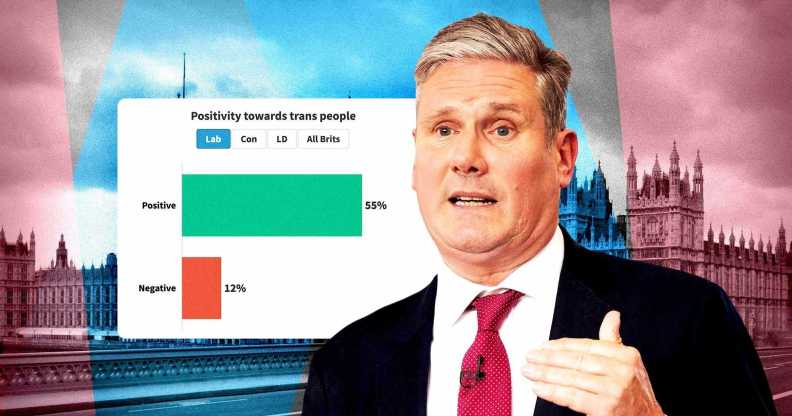The numbers don’t lie – Labour is woefully out of touch with its own voters on trans rights

Keir Starmer’s Labour Party is out of step with its voter base on the issue of trans rights. (Getty Images/Ell Folan)
The Labour Party under Keir Starmer’s leadership has become increasingly out of step with its voter base on the issue of trans rights. Data journalist Ell Folan breaks down the numbers.
On Thursday (17 August), the Labour Party continued its backsliding on transgender rights, with Scottish leader Anas Sarwar refusing to say if he’d back the SNP’s gender reforms again.
This followed Labour leader Keir Starmer’s proclamation that the party now opposes self-ID for trans people, after he whipped Labour MPs to abstain on the Tories’ unprecedented use of a Section 35 order to block the SNP’s gender reform bill.
Yet in pursuing this ‘gender critical’ course, Keir Starmer is thoroughly out of touch with his own party’s base – a clear majority of whom support trans rights, and strongly disagree with the suggestion that there is some sort of conflict between the rights of women and trans people.
In a broad sense, Labour voters feel very favourably towards trans people. YouGov recently found that 55 per cent feel positively, versus just 12 per cent who feel negatively. This net rating of +43 is even better than amongst Lib Dem voters (+27) and much better than the general population (+14).
In addition to this, 72 per cent of Labour voters feel that people should be able to identify as a different gender than the gender assigned to them at birth, with only 13 per cent disagreeing. Labour voters’ net support for trans people (+60) is thus the highest of any demographic group in the poll.
Beyond general principles, Labour voters also do not side with Starmer on specific policy approaches.
Take the issue of self-ID and gender markers on legal documents. Keir Starmer has vowed to oppose self-ID, saying that “a woman is an adult female”. Yet his own party’s voters are intensely relaxed about trans people identifying as a different gender to their assigned sex.
YouGov polling shows that six in 10 Labour voters think people should be able to change their gender marker on official documents, while a plurality (42 per cent) think the government should make it easier for people to change their legal gender and 46 per cent want non-binary gender markers on passports.
Furthermore, shadow chancellor Rachel Reeves told the Times last year that she has “a problem” with trans women accessing women’s spaces, while shadow equalities minister Anneliese Dodds has vowed to “defend” single-sex spaces. However, for the Labour party’s own voters, it’s not an issue at all.
Labour voters agree by wide margins that trans women should be welcome in women’s spaces, with only a small minority opposing the idea. Notably, despite endless moral panic around trans women’s access to toilets, Labour voters think trans women should be allowed into women’s toilets by a stonking margin of 57 per cent to 27 per cent.
When asked if expanding trans rights presents a “risk” to women’s rights, only 24 per cent of Labour voters said ‘yes’, while 52 per cent said ‘no’. Once again, people who voted for Labour in 2019 were the most trans-supportive demographic (with Tory voters the least supportive).
This groundswell of support for transgender people and their rights should give Starmer pause as he steers Labour towards a ‘gender critical’ equalities policy. Most opposition to trans rights comes from people who barely engage with the topic and know very little about it – support for expanding trans rights is actually highest amongst people who closely follow news stories about the issue.
Of those who pay a “lot of attention” to the issue of trans rights in the news, 55 per cent want to make transition easier; 57 per cent think expanding trans rights poses no threat to women’s rights; and 54 per cent want a non-binary option on passports.
The more informed a person is about trans rights (and the more engaged they are with news stories about the issue), the more likely they are to be supportive.
So, which demographic pays the most attention to stories around trans rights? In other words, which demographic is most likely to contain huge numbers of very passionate, engaged and dedicated supporters of trans rights? You guessed it correctly – it’s Labour voters.
When surveyed in May 2022, a total of 53 per cent of Labour voters paid some or a lot of attention to news stories about the issue of trans rights, versus just 25 per cent of Tory voters and 35 per cent of voters overall. This is by far the highest engagement of any demographic in the poll, even higher than young people (50 per cent).
When we consider all of this data together – large levels of support for trans rights amongst Labour voters, and high levels of engagement with the issue – the Labour party should start to worry.
To win in 2024, the party will need to keep its electoral base onside; it cannot simply rely upon Tory defectors and Lib Dem tactical voting to win a parliamentary majority. There are quite literally millions of Labour voters who are deeply engaged with the issue of trans rights, and the data shows that they tend to be passionately and overwhelmingly supportive.
If Labour turns their back on trans rights, they should not be surprised if trans people and their allies ultimately decide to turn their backs on Labour.
Ell Folan is a data journalist and the founder of Stats for Lefties
How did this story make you feel?

